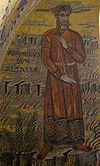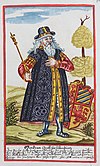Etichonids
| Etichonid dynasty | |
|---|---|
| Country | Francia East Francia Holy Roman Empire |
| Founded | 7th century |
| Founder | Eticho |
| Final ruler | Gertrude of Dagsburg |
| Dissolution | 1225 |
The Etichonids were an important noble family, probably of Frankish-Burgundian origin,[1] who ruled the Duchy of Alsace in the Early Middle Ages (7th–10th centuries). The dynasty is named for Eticho (also known as Aldarich), who ruled from 673 to 690.
The earliest accounts record the family's beginnings in the pagus Attoariensis around Dijon in northern Burgundy. In the mid-7th century a duke of the region named Amalgar and his wife Aquilina are noticed as major founders and patrons of monasteries. King Dagobert I and his father made donations to them to recover their loyalty and compensate them for the losses that they had sustained as supporters of Queen Brunhild and her grandson, Sigebert II. Amalgar and his wife founded a convent at Brégille and an abbey at Bèze, installing a son and daughter in the abbacies. They were succeeded by their third child, Adalrich,[2] who was the father of Adalrich, Duke of Alsace. This second Adalrich was the first to secure the ducal title. His name, Eticho, a variation of Adalrich, is used by modern scholars as the name of the family.
Under the Etichonids, Alsace was generally divided into a northern and a southern county, Nordgau and Sundgau. These counties, as well as the monasteries of the duchy, were brought under tighter control of the dukes with the rise of the Etichonids. There exists scholarly debate concerning whether or not the Etichonids were in conflict or alliance with the Carolingians, but it is possible that they were both: opponents of the extension of Charles Martel's authority in the 720s when he first made war on Alemannia, but allies when the Alemanni, under Duke Theudebald invaded Alsace (which had a large Alemannic element in its population) in the early 740s. The last Etichonid duke, Liutfrid, may have died fighting Theudebald on behalf of Pepin the Short with his son, Hilfrid.
Among the descendants of the Etichonids, in the female line were Hugh of Tours and his family, including his daughter Ermengard, who was wife to Lothair I and thus mother to three Carolingian kings. In the 10th century, the Etichonids remained powerful in Alsace as counts, but their power was circumscribed significantly by the Ottonians; by the 11th century, Pope Leo IX seemed unaware that his ancestors, the lords (or counts) of Dabo and Eguisheim for the previous half century were in fact the direct descendants of the last Etichonids. Many notable European families trace their lineage to the Etichonids, including the Habsburgs.
Etichonid dukes and counts in Alsace
[edit](Note: Here the numbering of the counts is the same for all states, as all were titled Counts of Alsace, despite the different parts of land and its particular numbering of the rulers.)
| Ruler | Born | Reign | Death | Ruling part | Consort | Notes | |
|---|---|---|---|---|---|---|---|
| Eticho I Adalric |  |
635 | 662-690 | 20 February 690 | Alsace | Berswinde c.655 six children |
Founder of the family and first count of Nordgau. |
| Adalbert I | 665 | 690-722 | 722 | Alsace | Gerlinde of Pfalzel six children Berlinde two children |
Also duke of Alsace. | |
| Eberhard I | ? | 722-747 | 747 | Sundgau | ? one child |
Son of Adalbert I, retained Sundgau, the southern part of Alsace. | |
| Eticho II | 700 | 722-723 | 723 | Nordgau | Unknown two children |
Son of Adalbert I, retained Nordgau, the northern part of Alsace. | |
| Alberic I | ? | 723-747 | 747 | Nordgau | Unknown four children |
Son of Eticho II. | |
| Liutfrid I | 700 | 747-767 | 767 | Sundgau | Hiltrude two children |
Son of Adalbert I. | |
| Rhutard I | ? | 747-765 | 765 | Nordgau | Hirmisende no children |
Son of Liutfrid I, probably a usurper. Left no descendants. Nordgau passed to the Alberic's heir, Eberhard. | |
| Eberhard II | ? | 765-777 | 777 | Nordgau | Unknown one child |
Son of Alberic I. | |
| Liutfrid II | 745 | 767-769 770-802 |
802 | Sundgau | Hiltrude of Wormsgau four children |
Son of Liutfrid I. | |
| Garin | ? | c.769 | 769? | Sundgau | Unknown | Probably usurpers, as they don't seem to have family connections with the Etichonids. | |
| Pirathlion | c.770 | 770? | |||||
| Udalric | ? | 778-804 | 804? | Nordgau | Unknown | Probably usurpers, as they don't seem to have family connections with the Etichonids. | |
| Ruthelin | ? | 805-c.810? | before 817? | Nordgau | Unknown | ||
| Erchangaire | ? | c.810?-817 | 817? | Nordgau | Unknown | ||
| Wuorand | ? | 817 | 817? | Nordgau | Unknown | ||
| Hugh I | c.760 | 802-837 | 20 October 837 | Sundgau | Ava of Morvois four children |
Son of Liutfrid II. | |
| Eberhard III | ? | 817-864 | 864 | Nordgau | Unknown one child |
Son of Eberhard II. | |
| Liutfrid III | ? | 837-864 | 864 | Sundgau | Unknown three children |
Son of Hugh I. | |
| Adalbert II | ? | 864-898 | 898 | Nordgau | Unknown | Probably usurper. | |
| Hugh II | ? | 864-880 | 880 | Sundgau | Unknown no children |
Son of Liutfrid III, left no descendants. He was succeeded by his brother Liutfrid. | |
| Liutfrid IV | ? | 880-910 | 910 | Sundgau | Unknown one child |
Son of Liutfrid III. | |
| Eberhard IV | 840 | 898-910 | 910 | Nordgau | Adelinda two children |
Son of Eberhard III. | |
| Liutfrid V | ? | 910-938 | 938 | Sundgau | Unknown one child |
Son of Liutfrid IV. | |
| Hugh III | ? | 910-940 | 940 | Nordgau | Adelinda two children |
Brother of Eberhard IV. Also known as Hugo III. | |
| Guntram the Rich |  |
c.920 | 938-954 | 20 March 973 | Sundgau | Unknown one child |
Son of Hugh III, ruled Sundgau for a period, before returning it to the heir of Liutfrid V. Guntram was grandfather of Radbot, Count of Habsburg, founder of the House of Habsburg. |
| Hugh IV | ? | 940-959 | 959 | Nordgau | Unknown | Also known as Hugo IV. | |
| Liutfrid VI | ? | 954-977 | 977 | Sundgau | Unknown one child |
Son or brother of Liutfrid V. | |
| Eberhard V | ? | 959-973 | 18 December 973 | Nordgau | Liutgarde of Lotharingia one child |
Brother of Hugh II. | |
| Hugh V Raucus | ? | 973-986 | 986 | Nordgau | Unknown | Brother of Eberhard IV. | |
| Liutfrid VII | ? | 977-c.1003 | c.1003? | Sundgau | Unknown one child |
Son of Liutfrid VI. Left no descendants. The county seemed to have returned to non-hereditary rulership, by members of nobility with apparently no relation with the Etichonids.
Then Sundgau might have been given to the Habsburgs. | |
| Eberhard VI | ? | 986-1016 | 1016 | Nordgau | Bertha no children |
Left no descendants. | |
| Hugh VI | 
|
c.970 | 1000-1016 | 1048 | Eguisheim-Dagsburg | Heilwig of Dagsburg eight children |
Acquired Eguisheim, and by marriage added Dagsburg to his patrimony. Among his children was Bruno of Eguisheim-Dagsburg. After his brother's death in 1016, he was the heir to Nordgau, which became annexed to Eguisheim. |
| 1016-c.1030? | Eguisheim-Dagsburg-Nordgau | ||||||
| c.1030-1038 | Nordgau | ||||||
| 1038-1046 | Eguisheim-Nordgau | ||||||
| Gerhard I | ? | c.1030?-1038 | 1038 | Eguisheim | Petronice of Lorraine no children |
Left no descendants. Eguisheim reverted to his brother. | |
| Hugh VII | ? | c.1030?-1046 | 18 November 1049 | Dagsburg | Mathilde d'Eename two children |
Inherited Dagsburg, and after his brother's death, reunited it with Eguisheim. | |
| 1046-1049 | Eguisheim-Dagsburg-Nordgau | ||||||
| Henry I | ? | 1049-1065 | 28 June c.1065 | Eguisheim-Dagsburg-Nordgau | Unknown c.1040 four children |
||
| Gerhard II | ? | 1065 | c.1100? | Nordgau | Richarda four children |
||
| 1098-c.1100? | Eguisheim | ||||||
| Hugh VIII | ? | 1065-1089 | 5 September 1089 | Dagsburg-Nordgau | Mathilde of Montbéliard no children |
Inherits Dagsburg and Nordgau. He was dispossessed of Nordgau by Henry IV, Holy Roman Emperor, during the Investiture Controversy, and killed in the attempt of its recover. On his death with no descendants, his brother inherited only Dagsburg. | |
| Albert I | ? | 1065-1089 | 24 August 1098 | Eguisheim | Hedwig no children Ermesinde of Luxembourg 1096 Longwy two children |
||
| 1089-1098 | Dagsburg-Eguisheim | ||||||
| Hugh IX | ? | 1098-1137 | 1137 | Dagsburg | Gertrude of Loon three children |
Also known as Henry Hugh. | |
| Hedwig | ? | c.1100?-1126 | 1126 | Eguisheim | Gerard I, Count of Vaudémont 1080 four children |
After her death Eguisheim passed to Vaudémont line of the House of Lorraine. | |
| Hugh X | ? | 1137-1175 | 1175 | Dagsburg | Lutgarde of Sulzbach after 1142 four children |
Also known as Henry Hugh. | |
| Albert II | ? | 1175-1212 | 1212 | Dagsburg | Gertrude of Baden 1180 three children |
Also count of Moha. | |
| Gertrude |  |
c.1190 | 1212-1225 | 1225 | Dagsburg | Theobald I, Duke of Lorraine 1215 no children Theobald I of Navarre 1217 (annulled 1223) no children Simon of Leiningen 1224 no children |
With no heirs, after her death Dagsburg passed to the Leiningen family. |
Sources
[edit]- Hummer, Hans J. Politics and Power in Early Medieval Europe: Alsace and the Frankish Realm 600–1000. Cambridge University Press: 2005. See mainly pp 46–55.
References
[edit]- ^ L’Alsace, berceau des Habsbourg by Philippe Nuss, lecturer at Université Louis Pasteur de Strasbourg
- ^ He is referred to as Liutheric, a mayor of the palace, in the Life of Odilia.
